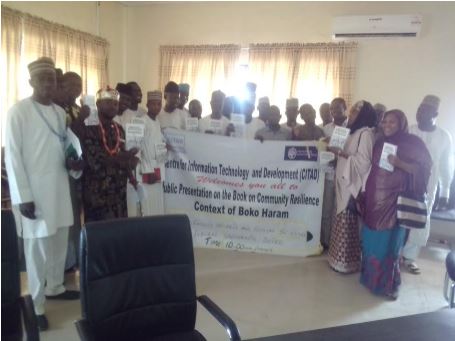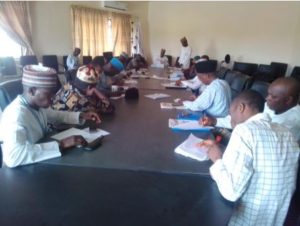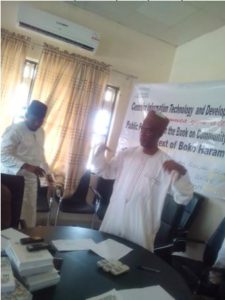Arguably, the first of such book to have rolled out of the press in Nigeria entered the national market today along with the controversy as to the very nature of Islam in relation to violence. This question turned out to be the most substantive one in the discussion that followed a background and content review of book at its presentation in Abuja attended mostly by journalists, academics and civil society activists. The 432 page book titled Understanding Community Resilience in the Context of Boko Haram Insurgency in Nigeria concluded that Nigeria as a whole is nowhere when it comes to the capacity of communities to resist criminality, terrorism, militancy or ruptures, in short and that the study of resilience in six states cutting across the northeast and the northwest by the research in the context of Boko Haram provides the mechanisms by which communities could and should protect themselves.
One of the questions asked in the aftermath of the briefing is whether Islam is not inherently violent in relation to other religions. This attracted three comments, two of them from professors of Political Science while the third is a co-editor of the new book. Of the two professors, one is a Christian while the other is a Muslim. All three cautioned against such claim if not in historical context of militancy or violence.
 Professor Jibrin Ibrahim who spoke last but who offered the most elaborate clarification said a lot of social and political factors come into play when we talk about religion and violence broadly, adding that what is most crucial in the case of Nigeria is that both Islam and Christianity have been undergoing internal transformation since the mid 1970s.
Professor Jibrin Ibrahim who spoke last but who offered the most elaborate clarification said a lot of social and political factors come into play when we talk about religion and violence broadly, adding that what is most crucial in the case of Nigeria is that both Islam and Christianity have been undergoing internal transformation since the mid 1970s.
While this has taken the form of Pentecostal factionalisation in Christianity, it assumed the Izala challenge to Sufism in Islam, he said. “We are, therefore, living in a time when there have been transformation and religion has been the most active arena for activismâ€, Professor Ibrahim, an Anglican, said, pointing out how religion has become very crucial area for social mobility, from educational provisioning to employment. Noting how this is also happening at a time of state withdrawal from social services provisioning, Professor Ibrahim added how all these affect socialisation because young people who move out of mainstream Christianity or Islam almost always end up replacing the authority and wisdom of their parents with the wisdom and authority of their new religious faction or group and hence the possibility of their being directed along certain lines. Citing just two of such, he mentioned the tendency among certain Christians to reject medical attention or blood transfusion, concluding that the Nigerian society has allowed “the minority to take the upper hand on interpretation of religionâ€. He, therefore, called for spending more time on the Sociology of religion.
Professor Nuhu Yaqub, former Vice-Chancellor of the University of Abuja and immediate past Vice-Chancellor of Sokoto State University who also intervened in answering the question as to why Islam appears to be more violent argued against starting to compare which of Islam or Christianity is more violent. There is none of the two that preaches violence, he maintained, backing the statement up by saying that Islam which insists that God is with the person who is patient could not be a violent religion.
Contending that militancy in Islam should be placed squarely in their historical context, Professor Yaqub noted Muslims’ sense of being submerged by the West’s relationship with Islam. Like the Chinese, some Islamic civilisations such as Iran consider theirs to be old and resistant to impositions by looking for evidence of such, he pointed out, arguing that “some people use their frustration to react to what is happening around themâ€.
 In his comment on the question, Mallam Y Z Y’au, Executive Director of the Centre for Information Technology and Development, (CITAD), the publishers of the book said the matter should be seen from the point that violence would always find a framework and the framework could be religion. But that, he said, does not mean that the religion which provides violence a framework is violent. He recalled a study by the United States Institute of Peace on why those who joined Boko Haram did so. The result showed that over 70 % of those who joined did so in terms of socio-economic reasons.
In his comment on the question, Mallam Y Z Y’au, Executive Director of the Centre for Information Technology and Development, (CITAD), the publishers of the book said the matter should be seen from the point that violence would always find a framework and the framework could be religion. But that, he said, does not mean that the religion which provides violence a framework is violent. He recalled a study by the United States Institute of Peace on why those who joined Boko Haram did so. The result showed that over 70 % of those who joined did so in terms of socio-economic reasons.
His explanation connects with one of the policy recommendations of the book in the content review he presented before the discussion session. That is the challenge of “people teaching what is not the religion at all†in schools partly because any Christopher Daniel in Nigeria is assumed to be capable of teaching Christianity just as any Garba Mohammed is also assumed to be competent to teach Islam. “Beyond regulating how people teach and practice religion, there must be scrutinising of what is taughtâ€, he submitted.

Cardinal Onaiyekan
Cardinal John Onaiyekan, the Catholic Archbishop of Abuja would most likely agree with the immediate point above, having called attention to the problem of no one knowing the content of what multiples of religious leaders might be dishing out in the villages at a time all manner of people claim the status of religious leadership. Onaiyekan was speaking on June 13th, 2017 at the Conference on Protection of Holy Sites organised by the peacebuilding INGO, Search for Common Ground, (SFCG).
Similarly, Ignatius Kaigama, the Bishop of Jos and President of the Catholic Bishops Conference of Nigeria would most likely agree with Professor Jibrin Ibrahim in the light of his memorable warning at the Catholic Bishop’s Conference at Our Lady Queen of Nigeria Pro-Cathedral in February 2015. Insisting on avoidance of flamboyant spirituality and noisy liturgy in favour of “teaching the people values of internalised prayers from the heart†Bishop Kaigama warned against “market place prophecies and visions, charismatic display of talents and material salvationâ€. Emphasising sober Christianity without tricks, rhetoric, fanfare and the craze for social media publicity, the Bishop put the conquest of poverty and narrowing of the yawning gap between the rich and the poor as the core challenge for Christianity.
 The categorical nature of his intervention as reported by the News Agency of Nigeria, (NAN) speaks to the factionalisation Professor Ibrahim talked about in the case of Christianity. In the case of Islam, there might exist no better account than the documentation in Where I Stand, the joint autobiography of the late Sheikh Abubakar Gumi with Professor Ismaila Tsiga, published by Spectrum Books in 1992. Chapter Eleven of the book has been interpreted by some as a prediction of Boko Haram.
The categorical nature of his intervention as reported by the News Agency of Nigeria, (NAN) speaks to the factionalisation Professor Ibrahim talked about in the case of Christianity. In the case of Islam, there might exist no better account than the documentation in Where I Stand, the joint autobiography of the late Sheikh Abubakar Gumi with Professor Ismaila Tsiga, published by Spectrum Books in 1992. Chapter Eleven of the book has been interpreted by some as a prediction of Boko Haram.
Even if only to the extent of the recommendation on checkmating the lack of centre of authority in religious teaching and practice, Understanding Community Resilience in the Context of Boko Haram Insurgency in Nigeria might have done its duty to the Nigerian State and humanity as far as use of religion by any violent group to legitimise violence is concerned. There are about six more such recommendations on building up resilience in the communities in the book.
Beyond the policy arena, the book provides the conceptual, theoretical and methodological jump off points for students of resilience in the social sciences in Nigeria as well as an African case study of resilience in the wider world. Resilience is, at the moment, a hotly contested concept in critical security studies where it has been dubbed the structural adjustment version of security provisioning – pushing that responsibility from the state to the people by naturalising such transfer in popular psychology. That is the debate this book might trigger in the Nigerian context where it is certain to be the first of such published material on the subject. It is published by CITAD, the Kano based knowledge NGO which has already published highly successful titles recently.
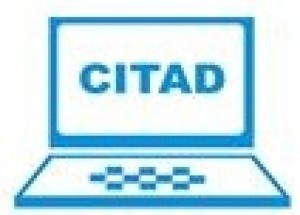


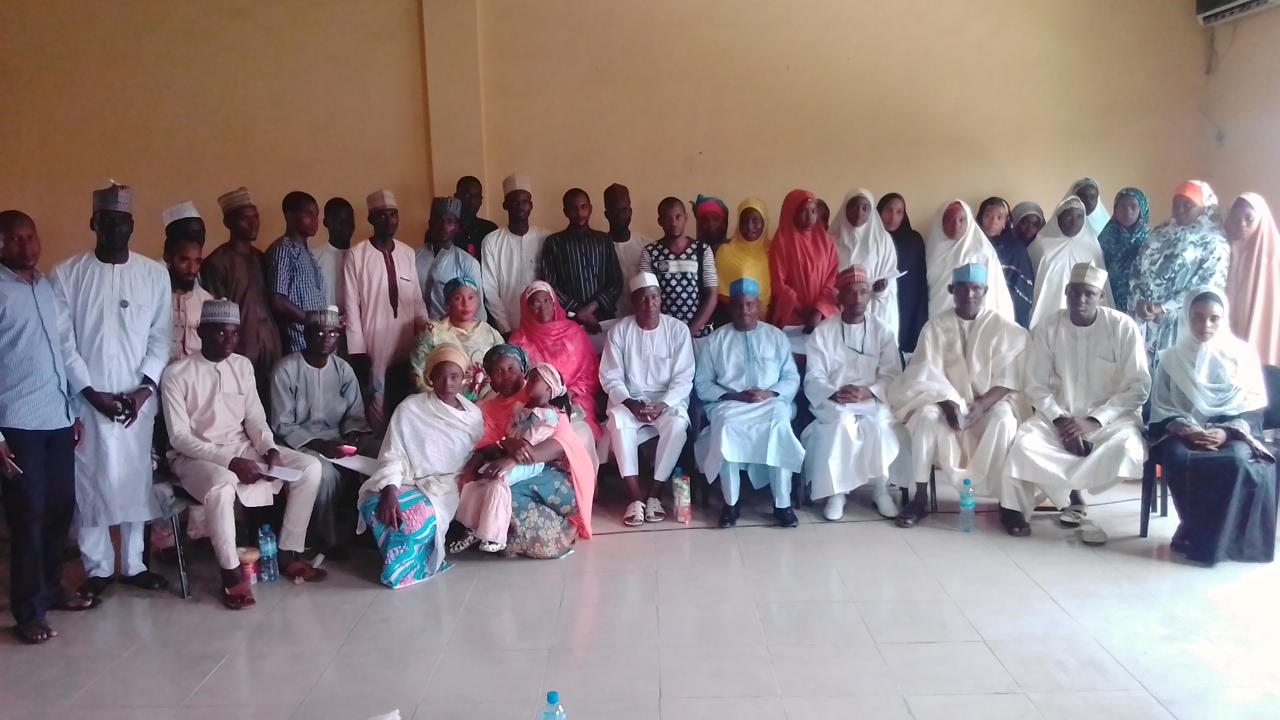

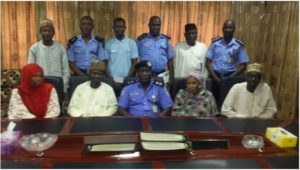

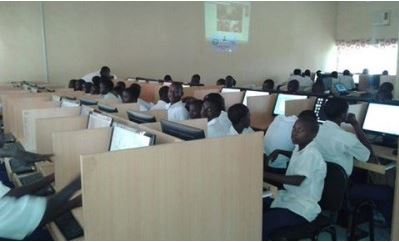




 Professor Jibrin Ibrahim who spoke last but who offered the most elaborate clarification said a lot of social and political factors come into play when we talk about religion and violence broadly, adding that what is most crucial in the case of Nigeria is that both Islam and Christianity have been undergoing internal transformation since the mid 1970s.
Professor Jibrin Ibrahim who spoke last but who offered the most elaborate clarification said a lot of social and political factors come into play when we talk about religion and violence broadly, adding that what is most crucial in the case of Nigeria is that both Islam and Christianity have been undergoing internal transformation since the mid 1970s. In his comment on the question, Mallam Y Z Y’au, Executive Director of the Centre for Information Technology and Development, (CITAD), the publishers of the book said the matter should be seen from the point that violence would always find a framework and the framework could be religion. But that, he said, does not mean that the religion which provides violence a framework is violent. He recalled a study by the United States Institute of Peace on why those who joined Boko Haram did so. The result showed that over 70 % of those who joined did so in terms of socio-economic reasons.
In his comment on the question, Mallam Y Z Y’au, Executive Director of the Centre for Information Technology and Development, (CITAD), the publishers of the book said the matter should be seen from the point that violence would always find a framework and the framework could be religion. But that, he said, does not mean that the religion which provides violence a framework is violent. He recalled a study by the United States Institute of Peace on why those who joined Boko Haram did so. The result showed that over 70 % of those who joined did so in terms of socio-economic reasons.
 The categorical nature of his intervention as reported by the News Agency of Nigeria, (NAN) speaks to the factionalisation Professor Ibrahim talked about in the case of Christianity. In the case of Islam, there might exist no better account than the documentation in Where I Stand, the joint autobiography of the late Sheikh Abubakar Gumi with Professor Ismaila Tsiga, published by Spectrum Books in 1992. Chapter Eleven of the book has been interpreted by some as a prediction of Boko Haram.
The categorical nature of his intervention as reported by the News Agency of Nigeria, (NAN) speaks to the factionalisation Professor Ibrahim talked about in the case of Christianity. In the case of Islam, there might exist no better account than the documentation in Where I Stand, the joint autobiography of the late Sheikh Abubakar Gumi with Professor Ismaila Tsiga, published by Spectrum Books in 1992. Chapter Eleven of the book has been interpreted by some as a prediction of Boko Haram.
